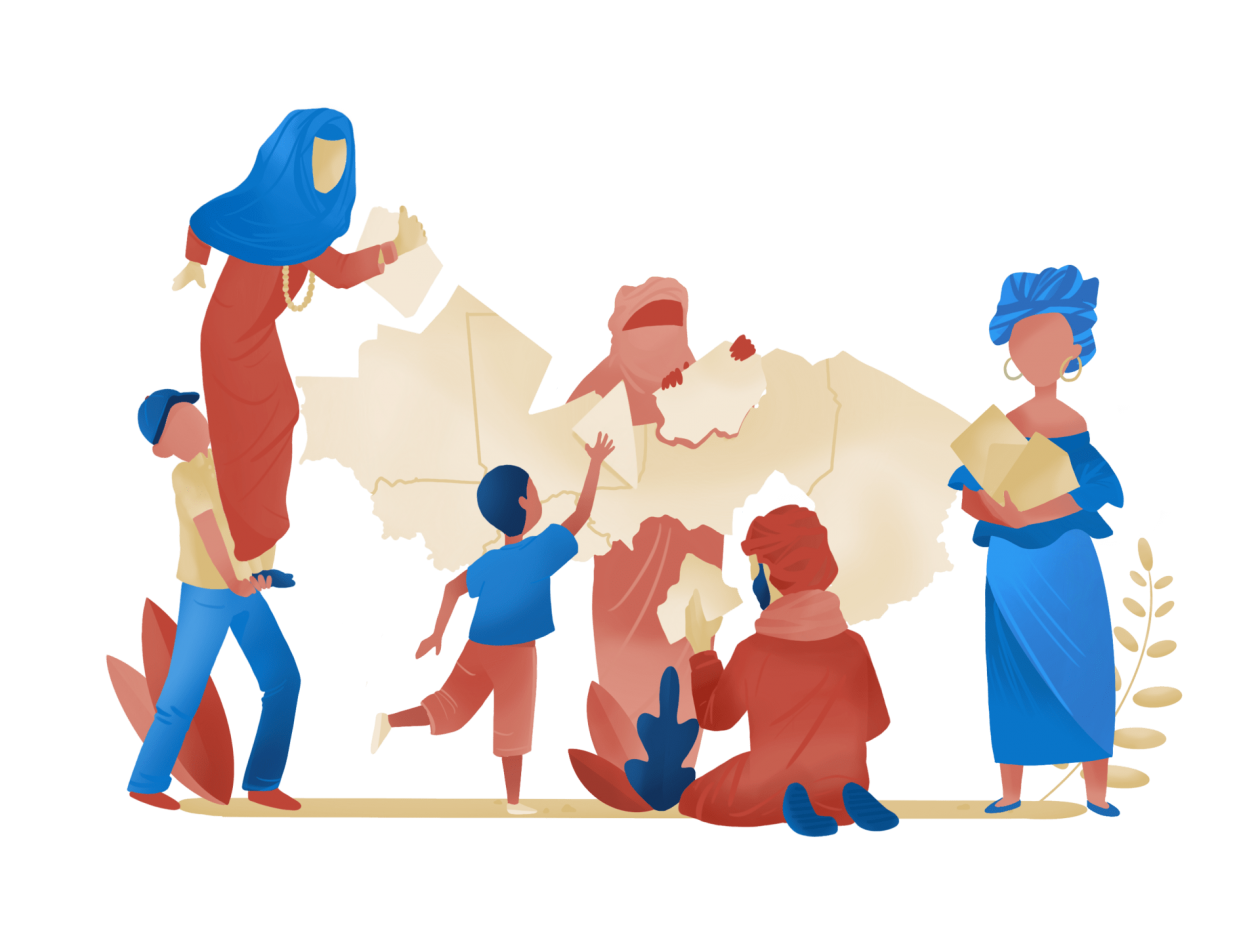
Jean-Yves Le Drian
French Minister for Europe and Foreign Affairs
The Sahel Alliance was created in 2017 to provide concrete and collective responses to the challenges facing the populations of Burkina Faso, Mali, Mauritania, Niger and Chad. Challenges that are only growing - from social vulnerabilities to the effects of climate change. Challenges that are increasingly intertwined, with instability setting the stage for disruptions to security which, in turn, reinforce it. Challenges accentuated, of course, by the health crisis of the coronavirus and its consequences in all areas...
Read more
Christoph Rauh
Africa director of the German Federal Ministry of Economic Cooperation and Developpment
Chairman of the Sahel Alliance steering commitee
Within the 3 years of its existence the Sahel Alliance has substantially grown, becoming a unique and effective coordination platform. Starting out with the three founding members EU, France and Germany, it has continuously grown now compromising of thirteen development partners who stand for a portfolio of 17,1 billion euros (31/12/2018)...
Read moreThe G5 Sahel region, between potentials and challenges
The G5 Sahel region (Burkina Faso, Mali, Mauritania, Niger, Chad) holds great potential, endowed as it is with abundant human, cultural and natural resources, offering opportunities for rapid growth.
The region also possesses a remarkable cultural and physical heritage, including in particular the Banc d’Arguin National Park, the Ennedi Massif, the historic library of Timbuktu…
In terms of natural resources, the Sahel is home to some of the largest aquifers on the continent, as well as important surface waters such as Lake Chad and the Niger River. The region is rich with oil, natural gas, gold, iron… These resources present an important opportunity for economic diversification, the development of value chains and the livelihoods of the inhabitants.
The region also has great potential for renewable energy, particularly solar and wind, which is still largely under-exploited.
Despite these strengths, the Sahel remains one of the poorest regions in the world, facing both security problems and strong economic, social and environmental vulnerabilities. Nearly half of the Sahelian population lives on less than $ 1.25 a day and the countries in the region are ranked among those with the lowest development index.
For several years, the five countries have been confronted in various parts of their territories with multifaceted crises and security threats which are hampering peace and sustainable development in the region. In 2014, the heads of state of the region created the G5 Sahel, an intergovernmental framework for cooperation, to coordinate their actions and offer a regional response to the various challenges.
The Sahel Alliance in 3 minutes
Aware that crises are largely rooted in poverty, injustice and the lack of essential services, several donors have decided to combine their actions, with the desire to support stabilisation and long-term development efforts of the G5 Sahel countries, and particularly to reach outlying and neglected areas.
The Sahel Alliance was launched in 2017 by France, Germany and the European Union. The initiative now involves 13 multilateral and bilateral development partners. Its primary objective is to support the G5 Sahel countries in crafting a coordinated, joint, appropriate and effective response to the challenges they face. The Sahel Alliance is not a new organisation or a financial advocacy forum, but rather a mechanism to strengthen the coordination of partners for faster, more effective aid with greater impact.
Strengthened relations and dialogue with the G5 Sahel within the framework of the security-peace-development nexus
Having been consulted regularly throughout the construction of the conceptual framework of the Sahel Alliance starting in 2017, the five countries and the Permanent Secretariat of the G5 Sahel have continuously shared their common priorities and concerns. While the G5 Sahel and the Sahel Alliance share development goals, their functioning and prerogatives tend to be more complementary than juxtaposed.
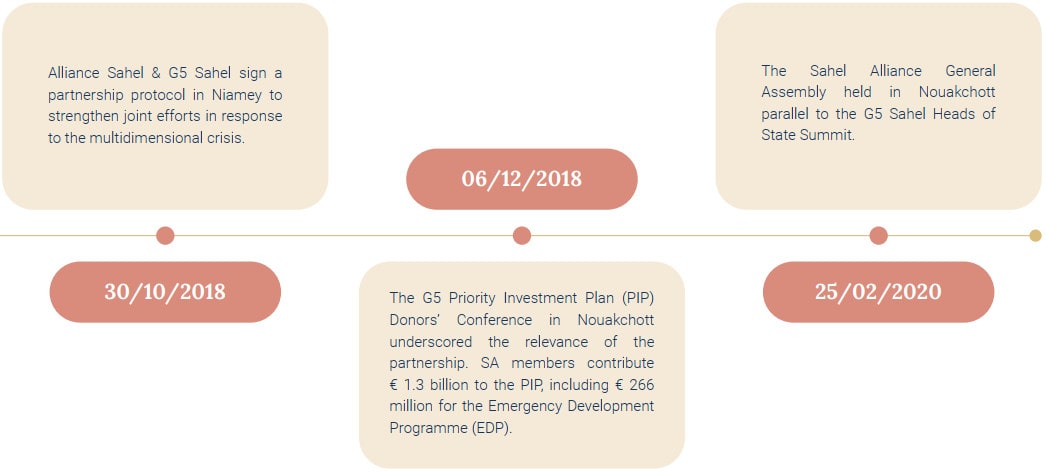
Starting 2018, the Sahel Alliance has encouraged a specific dialogue with each G5 country in the development field. This reinforced framework for AS – G5 dialogue primarily supports an increased effort towards operational coordination, the identification of priority localities and intervention areas, the search for co-financing, the establishment of new financial instruments, the adaptation of intervention modes and procedures, support for public policy reforms, etc.
At the heart of the action: priority intervention areas
Identifying priority areas for intervention in consultation with the G5 countries is currently a major focus of the Alliance’s work.
The Integrated Priority Actions Framework (IPAF), adopted at the G5 Sahel Summit in February 2020, constitutes a reference document for donor programming in fragile cross-border areas.
In line with the principles of action prescribed by IPAF, the members of the Sahel Alliance are also working to effectively implement the integrated territorial approach (ITA). This aims to coordinate security, humanitarian and development actions to address the root causes of the crisis at the territorial level.
Identifying realistic, flexible and measurable actions in the fragile areas

Angel Losada
EU special representative for the Sahel
Bringing about genuine change in the Sahel requires a focused long-term engagement that is able to meet the population’s most urgent needs at the same time. This is no small task. The different crises that undermine progress in this vast region are deep-rooted and intertwined, requiring a coherent, efficient and coordinated response focused on fragile and priority areas...
Read moreActing on the root causes of vulnerability

Maman Sidikou
Executive Secretary of the G5 Sahel
The Sahel Alliance and the G5 Sahel have initiated a constructive collaboration to achieve their common development objectives. In order to formalise and circumscribe the framework of their collaboration, to increase their impact and accelerate the implementation of joint projects, a Partnership Memorandum of Understanding was signed between the Executive Secretariat of the G5 Sahel and the Alliance Coordination Unit (ACU) on October 30, 2018...
Read moreDevelopment projects that meet the priorities of the G5 Sahel
The projects supported by members of the Sahel Alliance align with the national development plans of the 5 countries, but also with the frameworks established by the G5 Sahel. Two major initiatives are driving and bringing together a large number of development projects:
- The Priority Investment Programme (PIP)
As part of its development mission and to make security actions in the region sustainable, the G5 Sahel developed a Priority Investment Programme (PIP) that consists of 40 regional projects, representing a cost of 2.4 billion euros, in 2014.
PIP projects mostly target the border areas of the Sahel and illustrate the solidarity and cooperation between these countries that have chosen to bring a regional solution to crises. The PIP mainly focus on infrastructure initiatives aimed at creating greater access (roads, bridges, air links, extension of telephone coverage), access to resources (agro-hydraulic projects, electrification) and governance (inclusion of women, support for justice). It also includes an emergency stabilization programme to be deployed in the most vulnerable regions. The contribution of Sahel Alliance members to the PIP amounts to 1.8 billion euros.
- The Emergency Development Programme
In 2018, the Heads of State of the G5 Sahel requested that the Permanent Secretariat of the G5 Sahel (SPG5 Sahel) urgently launch quick-impact projects: the Emergency Development Programme (PDU).
Read more about the Emergency Development Programme
Support and encourage the private sector in the Sahel

Sandra Kramer
Director of EU-AU Relations, West and East Africa, European Union

Maria Shaw-Barragan
Director, Global Partners Department-Operations in Africa, Caribbean, Pacific, Asia and Latin America
Prosperity and inclusive growth are critical factors in ensuring sustainable development, peace and stability. Improving the living conditions and perspectives of young people in the Sahel region is therefore essential...
Read moreThe Sahel Alliance in brief
6 priority sectors

Energy and climate

Agriculture, rural development and food security

Decentralization and basic services

Education and youth employment

Governance

Domestic security
4 cross-cutting themes

Gender

Youth

Climate

Private sector
5 countries

Burkina Faso
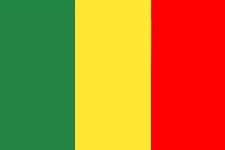
Mali
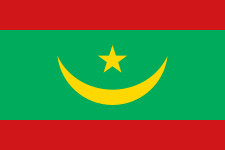
Mauritania
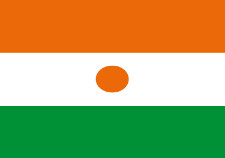
Niger

Chad
14 members
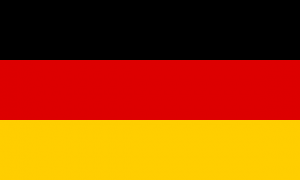
Germany

France

European Union
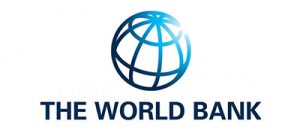
The World Bank

African Development Bank
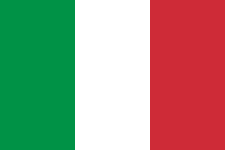
Italy

United Nations Development Programme (UNDP)

Spain
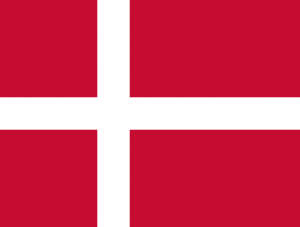
Denmark

Netherlands

Luxembourg

United Kingdom
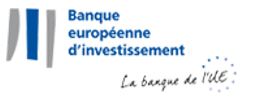
European Investment Bank

Norway
11 observer members
Observer members participate in decision-making meetings of the Sahel Alliance as well as in the work and activities of sectoral and thematic groups, including in the field in the G5 countries. However, they do not integrate their development projects into the portfolio designated and monitored by the Alliance.

USA

Canada

Japan
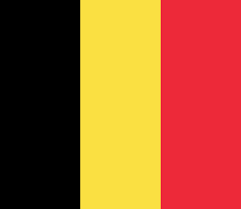
Belgium

Switzerland

Finland

International Finance Corporation

Bill & Melinda Gates Fundation

Tony Blair Institute for Global Change

Republic of Ireland

Organisation internationale de la Francophonie
For a multisectoral approach

Soukeyna Kane
Director of World Bank Operations for Mali, Burkina Faso, Niger and Chad
The World Bank Group's commitment to the Sahel will reach US $ 8.5 billion thanks to resources mobilised through the International Development Association for the 2020-2023 cycle. Increasing by more than 2 billion compared to the previous International Development Association (IDA) cycle, it will be part of the recently adopted Fragility, Conflict, Violence strategy...
Read moreThe need for strengthened and innovative partnerships

Marie-Laure Akin-Olugbade
Director general for West Africa, African Development Bank (AFDB)
On behalf of the President of the African Development Bank, Dr. Akinwumi A. Adesina, we welcome this 3- year report of the Sahel Alliance. As founding member, the African Development Bank (AfDB) has been actively involved in the Sahel Alliance since inception in 2017 to jointly confront the multidimensional crises and the unique development challenges facing the Sahel region...
Read moreSahel Alliance project portfolio
913 projects
under implementation as well as 108 projects under appraisal labelled Alliance Sahel and financed by the members in the region
€ 17.8 bn
of financial commitments for projects under implementation as well as €4 million of projects under investigation
€ 2.6 bn
invested in 2020 by Sahel Alliance members in the G5 Sahel countries
Project implementation: inventory*
Number of projects by priority sector
|
Education and youth employment |
Agriculture, rural development and food security |
Energy |
Governance |
Decentralization and basic services |
Domestic security |
Transectoral |
TOTAL |
|
|
Projects under study |
8 |
20 |
15 |
13 |
27 |
5 |
8 |
96 |
|
Current projects |
97 |
253 |
48 |
91 |
268 |
23 |
49 |
829 |
|
TOTAL |
105 |
273 |
63 |
104 |
295 |
28 |
57 |
989 |
|
|
|
|
|
|
|
|
|
|
Financial commitment (in millions of €)
|
Education and youth employment |
Agriculture, rural development and food security |
Energy |
Governance |
Decentralization and basic services |
Domestic security |
Transectoral |
TOTAL |
|
|
Projects under study Amount in € million |
117 |
448 |
851 |
432 |
1138 |
10 |
512 |
3508 |
|
Current projects Amount in € million |
1539 |
4396 |
2576 |
1898 |
5331 |
428 |
629 |
16797 |
|
TOTAL |
1656 |
4844 |
3427 |
2330 |
6469 |
438 |
1141 |
20305 |
|
|
|
|
|
|
|
|
|
|
Remainder to be disbursed (in millions of €)
|
Education and youth employment |
Agriculture, rural development and food security |
Energy |
Governance |
Decentralization and basic services |
Domestic security |
Transectoral |
TOTAL |
|
|
Projects under study Amount in € million |
117 |
448 |
851 |
432 |
1138 |
10 |
512 |
3508 |
|
Current projects Amount in € million |
830 |
2135 |
2235 |
730 |
2923 |
143 |
289 |
9285 |
|
TOTAL |
947 |
2583 |
3086 |
1162 |
4061 |
153 |
801 |
12793 |
|
|
|
|
|
|
|
|
|
|
* figures as of 12/31/2020
Analysis of implementation of the projects
Each member organisation has the opportunity to include, in Alliance Sahel’s project portfolio, development projects that meet the following criteria:
• Implemented in the G5 Sahel countries;
• Relates to one of the six key sectors of the Sahel Alliance;
• Implementation was not completed as of January 1, 2017.
The projects that fall under the portfolio are then designated as “Sahel Alliance”.
How was the project monitoring method developed?
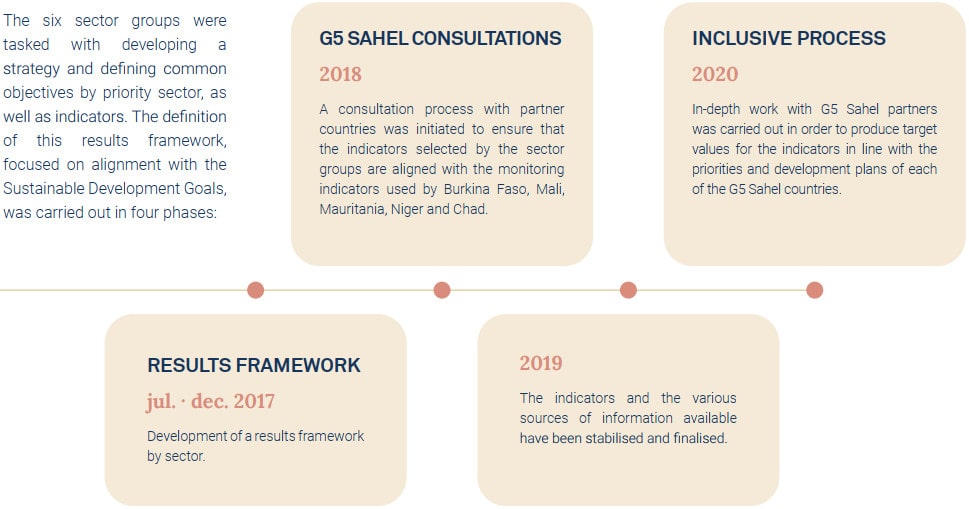
The validated results framework contains:
- 25 national impact indicators
- 15 so-called “project” indicators, corresponding to result / product / output indicators
The imperative of accountability

SEM Tertius Zongo
Director of the Sahel Chair of the Foundation for Studies and International Development Research (FERDI)
The need for the stakeholders involved in the development of the Sahel to strive to ensure the maximal effectiveness of their actions is all the greater in these times that are fraught with multifaceted challenges. This imperative requires that these actions be coordinated, but also that it be possible to monitor them in order to analyse them, report to the main stakeholders, and thus optimise their impact...
Read moreWhat changes in the lives of populations?
For all of the 507 projects selected in the monitoring and evaluation exercise, all the concrete achievements of the projects were collected. This made it possible to highlight 648 concrete and tangible achievements in view of the objectives of the Sahel Alliance on the ground realised in the first 3 years of the Sahel Alliance.

Education and youth employment
The Sahel is one of the youngest regions in the world
The birth rate remains high in the G5 Sahel countries, while life expectancy is increasing. The 50 million or so young people under the age of 30 now represent almost 65% of the total population of these countries. Creating economic opportunities for the populations and above all for the youth is a priority of the Sahel Alliance. This means increased access to education and job opportunities by 2022.
|
Indicator |
Number of people who have benefited from vocational training and/or skills development initiatives thanks to the support of SA members |
|
Result |
419 045 |


Agriculture, rural development and food security
Two out of three inhabitants make a living from agriculture and animal husbandry
With low yields and the loss of more than a third of crops each year, agricultural production in the G5 countries remains fragile. A situation made worse by climate change. It is therefore imperative for the region to develop sustainable agriculture that is resistant to climate change and likely to attract job seekers in order to reduce poverty. It must also succeed in managing the conflicts between farmers and breeders, an important factor in the crisis..
|
Indicator |
Hectares of land benefiting from sustainable management techniques thanks to the support of SA members |
Number of producers or breeders with access to advisory services for the sustainability and resilience of their activities |
Number of km of developed transhumance corridors or cattle trails |
Number of people who received food assistance |
|
Result |
1 479 565 |
514 617 |
1 134 |
2 910 286 |


Access to energy
The Sahel has enormous renewable energy potential
The electrification rate in all the G5 Sahel countries is around 20%, a rate twice lower than the average for sub-Saharan Africa and four times lower than the world average.
The sector remains largely characterised by the absence of competition and a production that is too limited to meet demand. Improving public electricity services therefore requires more efficient management of the sector, in order to reduce losses, improve the financial health of the operators, encourage private sector investment and ensure that populations have access to reliable, clean and affordable electricity.
Innovation is the other key factor in the development of the electricity sector. Innovative solutions must be found to lower the cost of new energies, improve network efficiency, increase the competitiveness of the operators and devices, and digitise infrastructures and decentralised services.
|
Indicator |
Number of people who received electrical access or improved electrical access thanks to the support of SA members |
Number of households with access to off-grid electricity services |
Installed renewable capacity (MW) |
Additional transfer capacity between Alliance countries (MW) |
|
Result |
554 233 |
146 302 |
54 |
Not reported |


Decentralisation and basic services
Supporting the improvement of living conditions in the most isolated regions
The availability and quality of basic public services are generally low in the G5 Sahel countries. The region has a high rate of infant mortality and access to drinking water, primary health care or social protection remains very limited.
Providing these services would not only accelerate the development of the region, but also restore or increase citizens’ confidence in public institutions and their legitimacy. The decentralisation and deconcentration of public services would make it possible to better ensure the provision of these services and to bring elected officials and administrations closer to their citizens, thanks to the transfer of competences and of related resources to the level of local communities and territories.
|
Indicator |
Number of people who have benefited from improved access to safe drinking water supply services thanks to the support of SA members |
Number of people with improved access to sanitation services |
Number of children vaccinated |
Number of women of childbearing age using a family planning method |
Number of medical facilities (hospitals, nursing homes, medical centres, etc.) that have benefited from the support of SA members |
|
Result |
5 363 385 |
1 595 320 |
3 397 996 |
661 211 |
520 |


Governance
The G5 Sahel countries are faced with a lack of institutional, territorial and financial governance. Citizens are demanding more justice and public institutions that are accountable and attuned to their needs. They also want to participate more in their country’s democratic life. Administrative delays, corruption and the poor redistribution of resources have led citizens to harbour little confidence in their institutions and governments. The Sahel Alliance can help, with the support of the states and of civil society, to strengthen the social contract at every territorial level.
|
Indicator |
Number of magistrates, judges, lawyers and registrars who have received training |
Number of civil society organisations (including CSOs, media, opinion leaders) that have received support from SA partners |
|
Result |
2 374 |
1 264 |


Domestic security
The multiplication of cross-border threats in the Sahel region (terrorism, trafficking, organised crime) is putting pressure on the internal security forces, as they lack human, financial and material resources and find it difficult to define clear common priorities. The Sahel Alliance works in particular on the justice and rule of law aspect, which is at the heart of the development-security nexus, in order to establish a relationship of trust between the ISFs and citizens, while strengthening their capacities.
|
Indicator |
Number of members of the internal security forces (police, gendarmerie and nomadic guard when there is one) who have benefited from training aimed at strengthening operational, judicial and administrative capacities |
|
Result |
677 |

Conclusion
Conclusion and future prospects

Adrien Haye
Head of the Sahel Alliance Coordination Unit
The Sahel Alliance is celebrating its 3-year anniversary. Although still young, this initiative launched by Germany, France and the European Union has been an undeniable success, bringing together, in three years, a large number of aid actors in the Sahel. Strong governance bodies have been put in place, without compromising the agility and flexibility of their origins. Partnerships have been forged with the G5 Sahel, which is fully involved in our decisions and whose concerns must remain the foundation and framework of our interventions...
Read moreClosing word

Ms. Arancha Gonzáles Laya
Spanish Minister of Foreign Affairs, European Union and Cooperation
President of the General Assembly of the Sahel Alliance
Three years after its creation, the Sahel Alliance has established itself as the main platform for coordination and consultation on international development cooperation in the region and as a privileged mechanism for dialogue with the G5 Sahel and its Member States...
Read more


